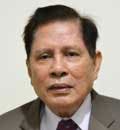Read this in The Manila Times digital edition.
AS a matter of strategy and vision, it is wise and smart for the Philippine state to combine the use of soft power in foreign relations with the much more developed concept of public diplomacy.
The success of states in enhancing their international reputation and support in the international community heavily depends on effective public diplomacy and the deft use of soft power in the contest for hearts and minds in international opinion.
The drawn-out dispute between states in the South China Sea — notably between China and Asean claimant states and particularly between China and the Philippines — has plainly developed into a contest in public diplomacy and soft power.
It is no accident that China has won little support in the dispute with its policy of spurning international law and the international maritime order under the United Nations Convention on the Law of the Sea (Unclos) and of ignoring the sovereign rights of claimant states to their exclusive economic zones (EEZs).
Conversely, the Philippines has won wide support in its bold defiance of Chinese bullying tactics and maneuvers in the waterway. The country's victory in the arbitration case at the Permanent Court of Arbitration at The Hague has become a landmark in the dispute.
The SCS situation today is a classroom illustration of the important relationship between public diplomacy and soft power.
Soft power, by definition, is the ability to affect others to obtain the outcomes one wants through attraction rather than coercion or payment. A country's soft power rests on its resources of culture, values and policies. A smart power strategy combines hard and soft power resources.
Public diplomacy, in turn, has a long history as a means of promoting a country's soft power and was essential in winning the Cold War. The current war against transnational terrorism is a struggle to win hearts and minds, and the current over-reliance on hard power alone is not the path to success. Public diplomacy is an important tool in the arsenal of smart power, but smart public diplomacy requires an understanding of the roles of credibility, self-criticism and civil society in generating soft power.
So far, the Philippines has steadily improved its geopolitical position through the effective use of public diplomacy and soft power.
Analogously, it will also be through public diplomacy and soft power that the contending nations can avert the outbreak of conflict in the region.
The SCS situation has not needed more the activity and wisdom of statesmen on both sides to prevent hostilities as it does now.
Continue reading with one of these options:
Ad-free access
P 80 per month
(billed annually at P 960)
- Unlimited ad-free access to website articles
- Limited offer: Subscribe today and get digital edition access for free (accessible with up to 3 devices)


